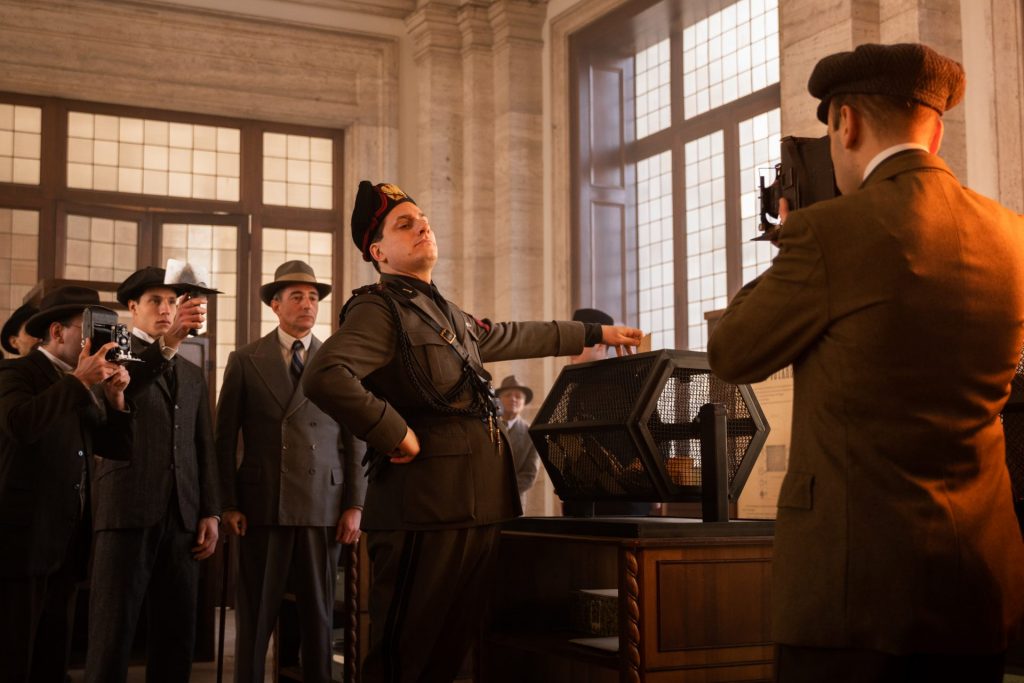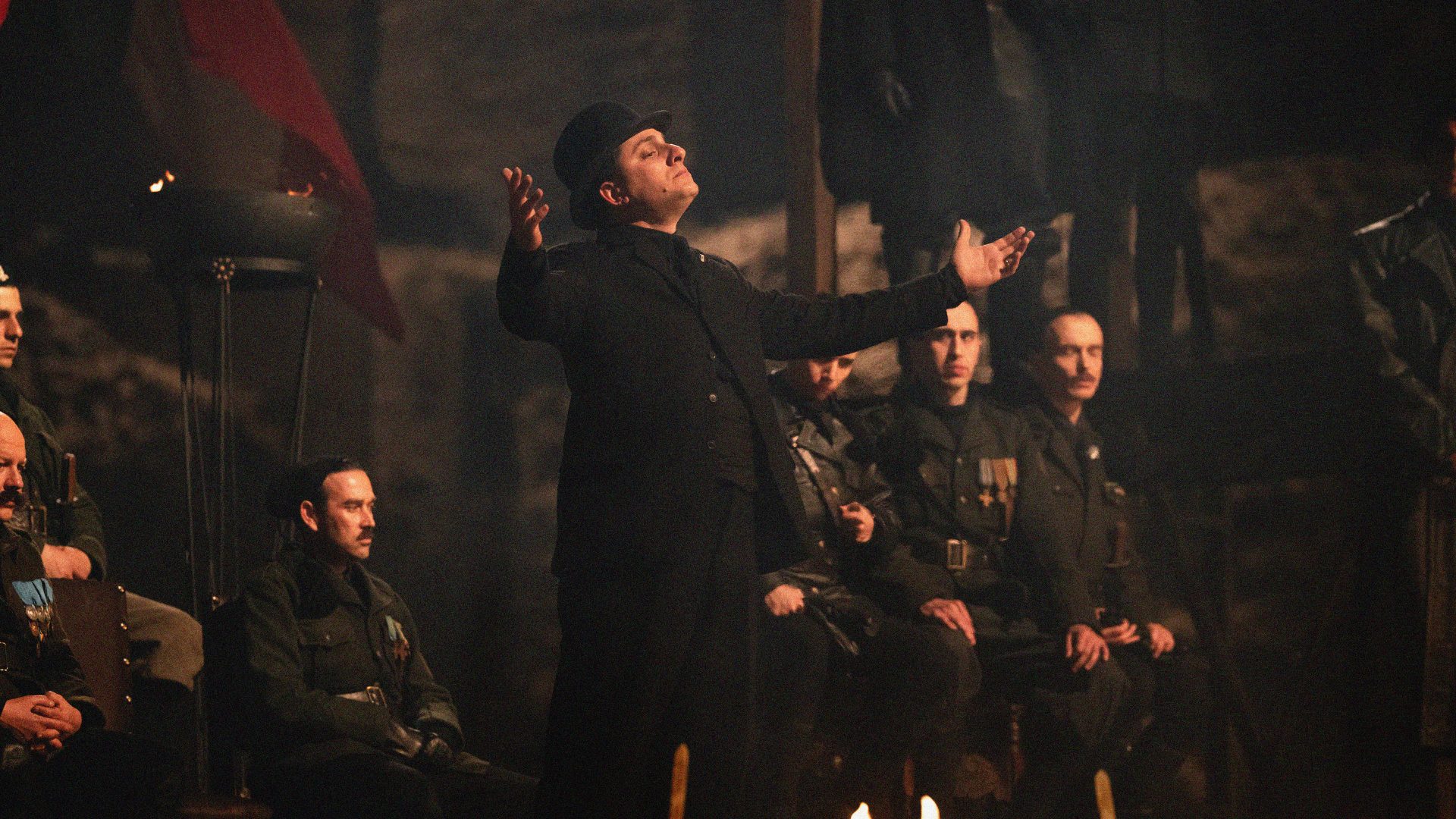On April 28, 1945, after a botched attempt to flee to neutral Switzerland, Benito Mussolini was executed by Italian partisans. Eighty years later, he is still never far from the Italian consciousness.
An eight-episode streaming series M: Son of the Century, released earlier this year, was appointment TV in Italy, creating a national conversation in the way Mr Bates vs The Post Office and Adolescence did in Britain. According to Antonio D’Onforio of the Italian culture website Sentieri Selvaggi, the show is “the opportunity to remember the fascist barbarity in this period of historical revisionism… and to rediscover a critical partisan conscience that these distracted years have reduced to the bare minimum.” The Italian government, seen by some as Mussolini’s heirs, are said to be less keen.
Directed by Britain’s Joe Wright and starring Luca Marinelli as the dictator, its eight episodes chart Mussolini’s rise from an impoverished journalist to the head of the Italian government. Future episodes charting his reign and his fall could follow – particularly if the show finds a foothold in America, where the story of a showman’s path to dictatorship feels particularly apt.
Its timeliness is a desperately tragic fact of political life as right wing populism from the US to Argentina, Hungary to India holds powerful sway. Just in case there was any doubt about the modern-day parallels, Mussolini turns to the camera at one point – this is a Brechtian fourth wall-smashing drama – and wryly comments: “Make Italy great again”.
Wright first made his name with the handsome literary adaptations Pride and Prejudice (2005) and Atonement (2007), which seem a million miles from Mussolini’s jackboots and black shirts. But Wright speaks about the series with a sense of urgency: “Mussolini wrote the far right populist playbook. Whether that be this idea of taking the legitimate concerns of a disenfranchised people and exploiting those people, those concerns; whether that be getting hold of the media and destroying the notion of truth. The nostalgia for mythical past. It’s the playbook that has been used over and over and over again since, and we’re seeing it around the world right now.”
I’m talking to Wright via Zoom from Italy, where the current prime minister is Giorgia Meloni, whose Brothers of Italy party hails the Italian Social Movement, the postwar redoubt of neofascists. Her second in command Ignazio ‘Benito’ La Russa is famous for his collection of fascist memorabilia.
The author of the award-winning novel on which M is based, Antonio Scurati was due to give a monologue on the state TV channel RAI 3 but was then uninvited in a move many saw as censorship following pressure from Meloni’s government. Scurati has labeled Meloni as an “heir of Mussolini.”
“In Italy, there’s a lot of revision around Mussolini,” Wright says. “It’s always the trains running on time. He wasn’t so bad. He just fell in with this bad apple, Hitler. Like a worried mother saying, “My son just fell in with the wrong crowd.” And that’s blatantly untrue.”
One of the elements that often gets lost in revisions of fascism is the full extent of the violence. The series reasserts its central role, depicting it in visceral, sometimes stomach-turning detail.
Wright says: “The ethos of fascism was centered around violence and violent revolution. Fascists saw themselves as revolutionaries, and they saw violence as cleansing; as something good. Casualties were justified in revolution. There’s a character who, at the end of the series, talks about what’s the sacrifice of one man, Matteotti [the socialist parliamentary deputy murdered by the fascists], for the sake of revolution? Of course, it wasn’t one man. There were many thousands of innocent people. And it was important to put that at the centre.”
A key to the success of the show is Luca Marinelli’s performance. It’s James Gandolfini-level brilliant. And it has to be. Marinelli is in practically every scene and has to manage the sticky task of being both repulsive and fascinating at the same time.
“One of the greatest privileges of my career has been working with Luca,” Wright says. Although the director had never met his star before filming, he was impressed by his work, particularly Martin Eden (2019). He also had a lead role in the arthouse hit Eight Mountains (2022) and appeared beside Charlize Theron in The Old Guard (2020).
“Luca looks nothing like Mussolini, but he’s a shape shifter,” Wright says. “If he imagines something, then the audience imagines it too. He’s also one of the sweetest human beings on the planet. He’s in almost every scene. Yet he kept his humanity and his sense of humour through what was a 127-day shoot.”

I confess to Wright that I was initially reluctant to watch the show, worried that it might – despite all the best intentions – glamorise Mussolini. “I understand that fear, and that’s certainly one that we all shared as well,” Wright admits.
“I get very nervous when people tell me they’ve only watched four episodes. I tell them: ‘Oh, God, keep watching, because by episode four, he’s a hero’. He manages to pull off the march on Rome. It’s played out as a farce and it’s quite funny.
“However, we all felt that it was important to trust the audience, to respect them and trust their intelligence. The show isn’t ever going to convert a fascist to anti-fascism, but we didn’t want to make a show that kind of was just fodder for the liberal echo chamber either. We wanted to reach those who maybe hadn’t thought about it, or were on the fence, or thought he got the trains running on time, so wasn’t all bad.”
So how do you make an episode drama, centered on one character played with the charisma of Marinelli and not make him even perversely appealing? After all, as audiences over the years, we’ve fallen for the likes of Walter White and Tony Soprano, and a variety of Lannisters.
“One of the important things was not to in any way make him aspirational: be that on a personal level or on a political level,” Wright answers. “The women in his private life, the mistresses and so on, we couldn’t make that titillating. What I began to realise was that for me, fascism is the politicisation of toxic masculinity. And that exists in individual households, that exists in a family, it exists in the workplace, it exists on a political and now global level.”
Recently, understanding fascism has become less a question of history and more about current affairs, I suggest. Wright says: “In the 80s, I was protesting against Thatcher and calling people fascists, without really understanding what the word meant. So, for me, it was an education to go and really try and understand the etymology of that word. At the heart of fascism is a void. There is nothing there, but certainly, pretty closely surrounding that void, is violence.”
Mussolini comes across in the show as a man who is far less ideological than he is an opportunist. “There is no ideology. It’s whatever will serve his ego,” replies Wright. “So, whether that be siding with the industrialists or siding with the so-called proletariat or peasants. He was anti-Catholic, anti-church, until it was useful to align with the church, and now he’s thought of as being a Catholic. He wasn’t at all. The same with the monarchy. It’s whatever served his ego and his own interests.”
I’m desperately trying not to bring the current president of the United States of America into the conversation, primarily because it’s so obvious without naming him. Beyond the figure of Mussolini, M also provides a guide of exactly what not to do when faced by a burgeoning fascist threat to democracy.
“Absolutely. Especially that very last scene of the show,” Wright says. “Mussolini was culpable and responsible. However, there is a shared responsibility for allowing him to get to where he got to. That’s really important to acknowledge on a human level and, also on a political level, which is why we chose to allow the audience at times, to be seduced by Mussolini, to humanise him.
“Because if you just demonise these characters, then that creates a sense of they’re the other. They’re not us and therefore we’re not responsible. In fact, they are us and I would even go as far as to say there’s a little bit of Mussolini in all of us. It’s our responsibility to choose otherwise, to choose to follow our higher selves rather than our base self, our ego.”
The show found success in both Italy and the UK – where it was renamed Mussolini: Son Of The Century – but at the time of writing has yet to find distribution deals – at the time of writing – in Germany, France and crucially the US. Wright says: “We took the show to various streamers and all of them are these liberal Hollywood executives said, ‘Oh, we applaud the show. It’s amazing.’ And one of them actually turned to me and said, ‘but it’s just too controversial.’ At which point I asked, ‘since when has anti-fascism been controversial?’ And I think the response is: since 2016.”
Is this a trend you see continuing? “What we’ll see more and more in Hollywood now is a centrist position. People in their private lives are liberal, but they also are aware they have a huge middle American subscribership that they have to appeal to, and they’re scared of alienating.”
Wright sees an analogue to the 1980s. “One of the reasons why the eighties were such a kind of dead zone of filmmaking, apart from notable exceptions, was this kind of centrist position. Though, what’s exciting is that there was a lot of great work done in the ‘80s, and there’s a lot of great work done in resistance.
“I think audiences will be looking for that work and so I think it’s possibly a very exciting time for maybe streamers like Mubi, for instance, which I’m an enormous fan of, and the Criterion Collection, and the BFI and places which streamers and subscription sites that are perhaps catering to an audience that are looking for something with a stronger point of view.”
Scurati has published five novels in the series. Are there plans to adapt the other books? “We’re in negotiations now with a streamer, and I can’t kind of reveal yet who with a streamer for American distribution. Once that happens, then people will feel more confident in the following seasons, myself included.
“The show has had a powerful impact in Italy and the UK, but it hasn’t been out in France or Germany or America yet, and so once it reaches those audiences, then I’m excited to see what will happen.”
I suggest that Hungary and Argentina could do with a dose as well. “Absolutely. I was in Berlin for the Berlinale there, and we screened some episodes. Afterwards, we went for dinner. I was standing in the street, smoking a cigarette with this guy from the kitchens, and these two young people came by and walked past me, and then walked back again and said, ‘Excuse me, did you direct M: Son of the Century?; And I said, ‘Yes, yes, I did.’ And they were really excited, and we stood on the street in the freezing, fucking cold having a conversation about what fascism looks like now.”
If having a conversation about what fascism looks like now is vital, then M: Son of the Century is a good place to start.
M: Son of the Century is streaming now on Sky Atlantic and NOW. John Bleasdale is a writer, film journalist and novelist based in Italy









